
Griselinia Hedging
GRISELINIA HEDGING
Griselinia Hedging – (Griselinia littoralis) is a dense attractive evergreen hedging plant. Originally from New Zealand with glossy, apple green, leathery leaves. It is an excellent hedging plant for seaside exposure and responds well to trimming to shape and establishes quickly. It can reach 8m in height.
- Variegated Griselinia – (Griselinia littoralis Variegata) is similar to green variety with leathery, bright green ovate leaves up to 10cm in length that are irregularly margined with creamy white.
- Hylands Green Griselinia –(Griselinia littoralis Hylands green) is a variety we selected and isolated in our own Nursery. It has dark green leaves almost the colour of laurel. It is bushier and more dense that the common variety. It also grows well by the seaside.
Griselinia may not be the most suitable hedge for areas which are prone to severe frost as it may not survive if the temperature drops below -10 or -12 degrees.
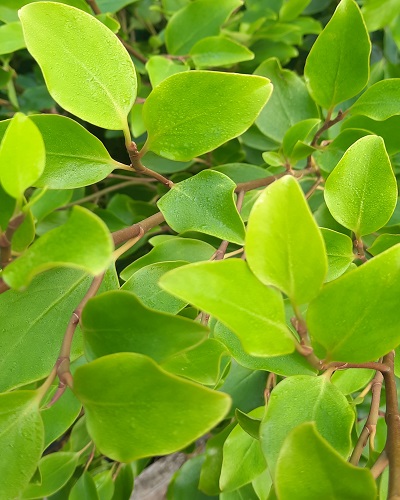
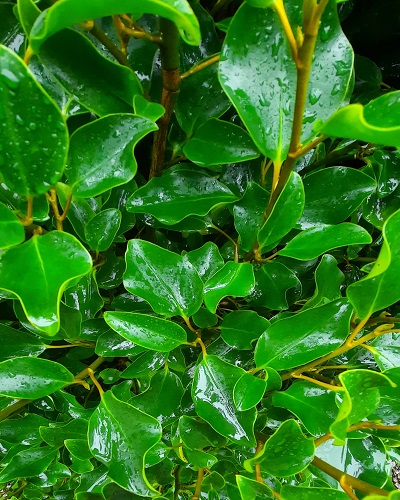
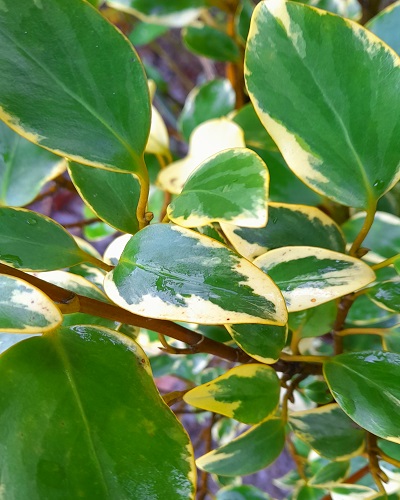
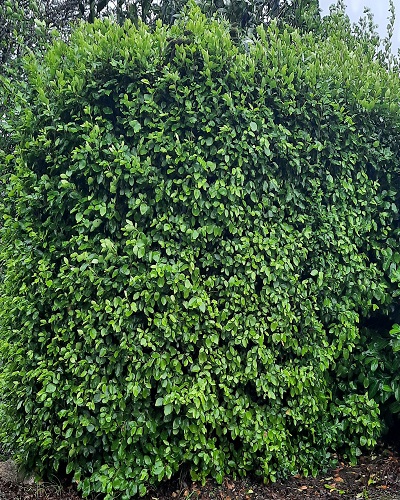
Hyland’s Nursery Griselinia Hedging Price List
Prices listed above are for collection from Hyland’s Nursery in Oulart. For more information please visit our terms & conditions page.
Images of our Griselinia Stock. The red lines on the Images below represent 50cm height differences from 50cm to 200cm
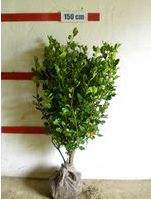
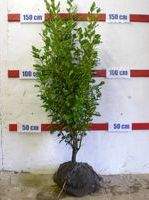
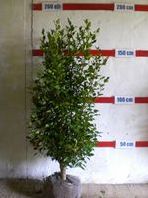
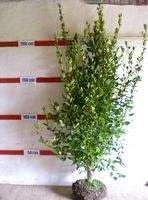
A Short Video Showing A Griselinia Hedge
Ways to buy Griselinia
There are three different ways you can buy our Griselinia plants
Pots or containers:
Griselinia in pots can be planted all year round and can be any size, from a plant in a 9cm pot to a plant in a very large tub. Their root is settled into the pot and the plant has been actively growing in the pot thus it is well established. A plant in a pot can be sown all year round. As it is established in the pot, there is little disturbance to the plant when planted into the ground so it is more likely to grow. It is seldom that a plant in a pot fails unless the watering conditions haven’t been correct. It will need to be watered in well when initially planted. If planted during a hot time or in the summer, it may need to be watered a few times a week until they get established in the ground.
Root balled:
Root balled plants are larger plants that come in a root wrap of hessian. You leave this hessian on when planting. You only plant these plants when the plant is dormant or has stopped growing for the winter. They are planted from October/November to April/May depending on what the season is like i.e. if the spring is early or not, or if the autumn is very dry.
Bare rooted:
There are plants that have no soil on their roots. They are usually small, single stemmed plants. It is important when you get these plants that you keep the roots moist and don’t let the roots dry out. You should keep them in the bag or heal the roots into sand or soil until you are ready to plant them. You should try to have the ground ready before you get them, and plant them as soon as you get them so they have a good chance of success. They should be planted between November and March but the earlier in the winter the better as it gives the roots a chance to settle in before the growth starts.
Planting tips
Planting tips
Smaller plants should be planted at a distance of 30cm apart in a single row. Larger plants won’t need to be planted as close, but how close will depend on how soon you want your hedge to look full.
Preparation before planting:
The ground should be clean and free from weeds and grass. This gives the new plants a good chance to get established. If the area you are going to plant them in has grass or weeds, the ground should be sprayed off a week or so before planting to avoid any competition. To help prevent too many weeds appearing after you have planted your hedge, I find it a good idea to put your grass clippings and mulch around the plants as this smothers out the weeds and helps prevent the plants drying out.
Depth:
The plants should be planted deep enough to cover the roots. They do not like to be planted too deep as this may kill them or stunt their growth.
Griselinia hedging doesn’t like to be lying in water so if the area you want to plant them in is wet, you may need to consider draining the ground or making a mound/ditch of top soil on top of the ground and plant them above ground into this topsoil.
Griselinia hedging can grow well in full sun and partial shade.
Aftercare:
Once the Griselinia hedging is established you can trim it once a year around mid to late summer. It shouldn’t be trimmed if the weather is really hot and dry. You can give your hedge a feed of any high nitrogen feed (e.g. in the nursery we use 18-6-12) or poultry manure pellets in late spring/early summer.
General problems with Griselinia hedging
Yellow leaves:
When the leaves turn yellow and fall off this may be caused by lack of water or too much water.
Lack of water (drought):
Griselinia hedging is a drought tolerant plant. If you have a newly planted hedge that is turning yellow and is losing its leaves, it is generally not getting enough water. It should not be let get too dry in the first year. If planted in a dry time you will need to water it in well and water it a few times a week- weather dependant.
Too much water (waterlogged):
If you have a more established hedge and it starts turning yellow, the ground may be water logged. Laurel doesn’t like sitting in water for a long period of time.
Stress:
If you have planted large root balled hedging, if your water conditions are correct, it may be the plant reacting to its change of environment and is under a little stress, but once it gets going it should be ok.
Hunger:
Another reason for your leaves turning yellow is hunger and your hedge may need a granule or liquid feed with high nitrogen or some poultry manure pellets.
If you have any questions, please do reach out to us by phone +353 87 277 3492 or email for answers.









